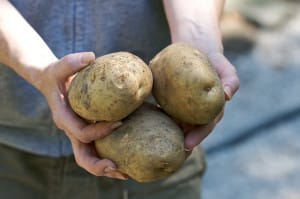[You can sign the petition Tell McDonald’s: No more toxic taters! here]
PAN North America
by Margaret Reeves
 |
When you think of potatoes, you might think of McDonald’s french fries. But what do we know about how those potatoes are grown? Are hazardous pesticides applied? And what might that mean to the health and wellbeing of communities in potato-growing regions?
The fact is, more than 1,750,000 pounds of pesticides were applied to U.S. potatoes in 2012. Topping the list of pesticides of concern, particularly in the potato-growing regions of Minnesota, is the highly hazardous fungicide chlorothalonil (a probable carcinogen). But this is just one of dozens of health-harming chemicals routinely applied in conventional potato production.
Fortunately, alternatives to chemical-intensive potato production have been developed, primarily by organic producers. So we know that pesticide-free solutions work. Moving McDonald’s — the world’s biggest potato buyer — toward demanding potatoes grown with these safer solutions is the precisely the mission of the Minnesota-based Toxic Taters campaign.
Pesticide-free spud production
Despite a marked lack of technical support, organic potato acreage in the U.S. almost doubled between 2005 and 2011, according to USDA. And in the EU, integrated pest management (IPM) techniques have decreased fungicide use by more than 60%.
This encouraging progress can be partially explained by the growing demands from a public that’s increasingly concerned about the negative impacts of chemically-intensive agriculture on human health and the environment.
Yet farmers need more than market demand for switching from chemical-intensive to organic production. As an ecologist and soil scientist, I’m always interested in learning about and sharing stories about the tools and knowledge farmers need to make that transition.
First, it’s important to understand the basics. Ecological pest management includes practices that support vigorous crop growth while providing biological — rather than chemical — controls of pests and diseases. Fundamentally, the approach is one of prevention, resilience and control rather than eradication.
Here are two key tools of ecological pest management for potato production:
Crop diversity. Growing different crops in rotation (or even together) creates a more complex, diverse environment and make it harder for pests and weeds to thrive. For potatoes, the soil borne fungus Verticillium dahliae can be effectively suppressed by including sweet corn and rapeseed in crop rotation. Mustard used as a winter crop and incorporated into the soil can control nematodes and weeds during the following season. And including alfalfa in the rotation is an efficient way to control weeds while providing natural sources of nitrogen to the potatoes.
Genetic diversity. There’s hardly a better example of the importance of genetic diversity than the famous potato famine of 1845 and 1846, in which one disease essentially wiped out Ireland’s genetically uniform potato crop. Fortunately, a wide diversity of potatoes exists (more than 4,000 varieties!), and with this diversity comes reduced susceptibility to disease.
We can thank the hard work of organic farmers and researchers in identifying, selecting and propagating these diverse varieties. For example, the variety “King Harry,” was developed from the variety “Prince Harry” by organic farmers in Maine in collaboration with Cornell University. Both varieties show resistance to pests like the potato virus Y and the Colorado potato beetle.
Combining varieties on the farm has also been shown to limit pest development by making it more difficult for the pests to spread throughout a heterogeneous landscape.
Supporting sustainable solutions
Although organic production in the U.S. continues to grow, it remains small compared to conventional production. Growers continue to face comparative disadvantage in terms of market access, access to organic inputs and relative costs of production. And research and extension services serving organic producers pale by comparison to those available to conventional growers.
We can help farmers adopt agroecological farming practices. For that, we need to help build market demand for sustainable and organic production — like convincing McDonald’s to procure sustainably produced potatoes. We also need to support public investment in organic farming.
We’re proud to be part of one of the leading organizations pressing for public support of sustainable and organic farming and the research needed to support it, the National Sustainable Agriculture Coalition(NSAC). Through NSAC, we work to address the many challenges facing farmers — including the lack of sufficient, appropriate, and relevant research, education and extension resources.
So please join me in supporting the communities in the potato-growing regions of Minnesota who are calling on McDonald’s to help potato farmers make the switch from chemically-intensive production to the use of safer, healthier agroecological methods of potato production.

